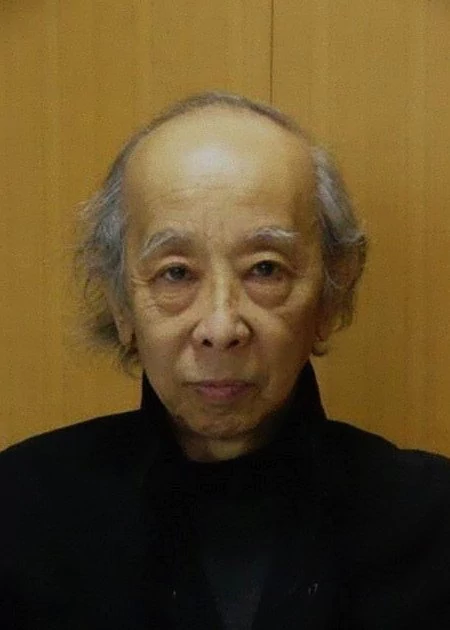
Jissoji started out with a respected arthouse trilogy, but quickly rebranded himself as a skilled genre/camp director. He's one of the more interesting and surprising directors to have come out of Japan, regardless of any personal preferences.
Movies
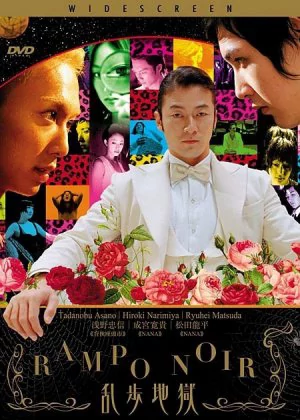
An amazing collection of shorts, brought to life by superb actors and featuring strong and diverse styles. A true sight to behold and without a doubt one of the best Japanese horror projects around.
Ten Nights of Dreams
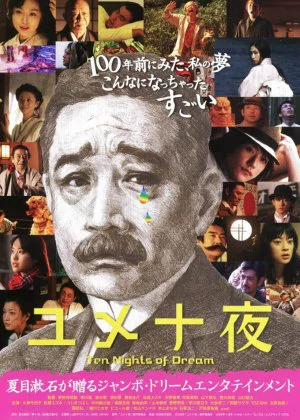
A wonderful collection of shorts, visually pleasing, fun to watch and from time to time refreshingly weird.
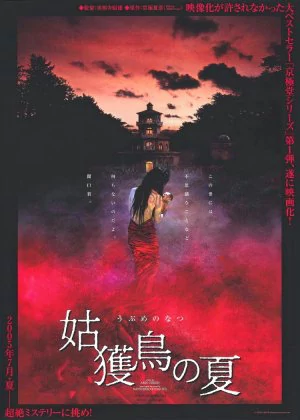
Akio Jissoji is somewhat of a cult figure. He started out as a director in the Ultraman franchise (both series and films) and ended his career directing obscure horror films. I've reviewed his segments in Rampo Jigoku and Yume Ju-ya, shorts that should give you a pretty good idea of what to expect from Ubume no Natsu [Summer of Ubume], his final standalone feature film. He died not long after, joining a prestigious list of directors who kept going right until their final breath. Even though Ubume no Natsu was made in 2006, it has little to no ties to the Asian horror wave that was all the rage back then. This is no 'less is more' horror flick trying to mimic the success of Nakata or Shimizu, instead the film harks back to the classic Japanese horror stories of Edogawa Rampo. Dark, twisted and supernatural, but with a strong psychological core. Ubume no Natsu is an adaptation of the first novel in the Kyougokudou series, a novel that is also enjoying its own manga adaptation right now. The film is set in the early 50s, following a detective who is called in to investigate the events surrounding a mysterious hospital. Patients, mostly children, keep disappearing on the hospital's premises. When members of the staff are also ending up dead, the neighborhood's imagination starts running rampant. Of course the case isn't so easily solved and several other people are brought in to try and explain the mysterious events. If you care about a great cast, this film has you covered. An insane amount of familiar faces are featured, from the lead roles down to the smaller, secondary parts. Shin'ichi Tsutsumi and Masatoshi Nagase are probably the most prestigious names, with actors like Hiroshi Abe, Susumu Terajima, Suzuki Matsuo, Rena Tanaka and Yoshiyoshi Arakawa also on board you just know you're in for a treat. It's great to see all of these actors brought together in one film and it's pretty clear they had a lot of fun shooting Ubume no Natsu. The presentation is top notch too. Even though Jissoji was already quite old when he shot this, the cinematography is quirky and playful. There are some great angles, the editing is fun and even though he uses the same visual tricks a few times too often, the film looks great throughout. The soundtrack is a bit more classic in nature, but goes well with the film. The two combined create a mysterious, dark and intriguing atmosphere, the kind you expect from a tale that could've been written by Rampo. Don't expect any gore, don't expend a typical Japanese suspense flick. Ubume no Natsu is a film that relies more on intrigue and mystery, with some perversion and psychological horror thrown in for good measure. The presentation is great, the cast is impressive and even though the film is quite long, it never drags or becomes boring. There are better films in the genre, but that's hardly a critique on this film. Read all
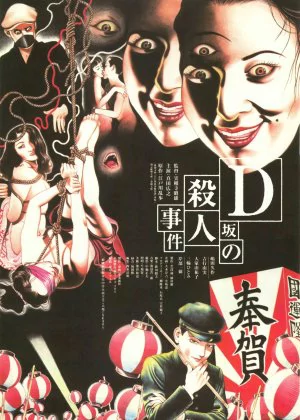
When someone like Jissoji takes on Rampo, there's a good chance something great will come of it. Murder on D Street isn't Rampo's most familiar work, but this dark tale of death and debauchery is clearly from his hand. Jissoji's direct and dynamic style is a perfect fit, making this a fine precursor to his entry in the Rampo Noir anthology. When it comes to adapting Rampo stories, it's really about bringing out that lurid, slumbering darkness that hides in people. Jissoji truly is the ideal man for the job. The cinematography looks stylish, the performances are restrained, and the score adds to the atmosphere. A remarkable film from a remarkable director.Read all
Ultra Q: The Movie
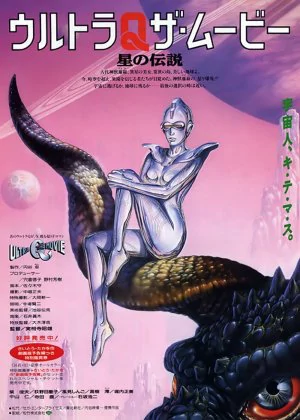
Akio Jissoji is no doubt one of the oddest directors to come out of Japan. In the West, he's best known for his Buddhist trilogy (an arthouse staple), in his home country he worked on some of the biggest pulp you can imagine. Ultra Q is one of those films, a fun yet elevated mix of tokusatsu and kaiju. The film's pulpy origins are abundantly clear, but Jissoji's excellent direction makes this a real hoot. The camera work is great, the effects are impressive, and the fantastical designs look cool. The pacing is solid too, and even though the story isn't all that demanding, it contains all the ingredients to make this an entertaining spectacle.Read all
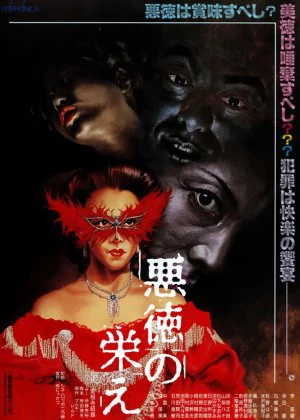
I guess I have no more excuses to ignore Akio Jissôji's oeuvre. Prosperities of Vice is the fifth Jissôji film I've seen and none of them have disappointed me so far. They've been mostly random watches (including two accidental anthology entries), but every single time I've been positively surprised. This film too went far above my expectations. I'd expected a pinku with some artistic intentions, but describing it like that is doing Prosperities of Vice a big disservice. While the Sade mythology leaves plenty of room for debauchery, Jissôji delivers a very stylish and relatively restrained film. For a film from the 80s it looks absolutely stunning, sporting superb camera work, neat and colorful styling and excellent use of lighting. The soundtrack too is distinctive and moody. The plot is a bit of a puzzle, but it was intriguing enough to keep me glued to the screen. A very interesting film, Jissôji deserves to be rediscovered.Read all
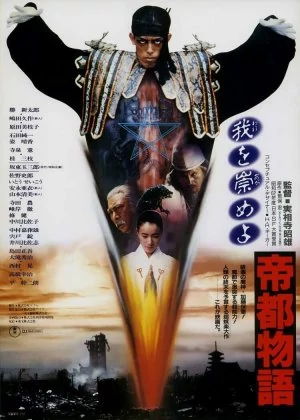
A pretty great genre film that made me think of Carpenter's dark fantasy work. Jissoji is clearly the better director though, with strong camera work, great lighting and some solid special effects he delivers a film that is not only good fun, but also looks surprisingly beautiful, even to this day. Quite the discovery this, I'll have to look into Jissoji some more.
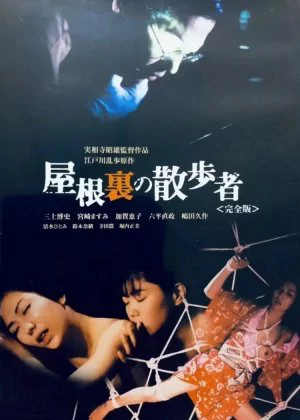
Jissoji adapts another Rampo story. The two are a great match, although with Jissoji it can be a little tricky to put a clear label on him. He's a director with some unique and varied sensibilities, handling auteur/arthouse productions and popular cheese with the same ease. The mix of the dark and the perverted, so typical for Rampo's stories, is another thing he really does well. Jissoji keeps it short and sweet, which is perfect for the simple premise. While the story remains basic, more effort was put into the mood. Thanks to the rather stylish cinematography and the pleasant score, Jissoji hits the right notes. It's not one of his more remarkable films, but an easy recommend for fans of both Jissoji and Rampo. Read all
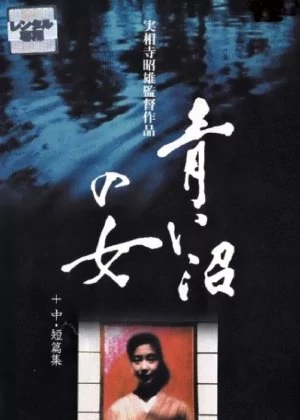
A classic kaidan (ghost) story by Jissoji. A director with a very recognizable style that matches the kaidan aesthetic. Blue Lake Woman can't quite hide its TV roots though, which seriously hampers the enjoyment of the film. Still, I'm quite sure fans of Jissoji will find plenty to enjoy here. Surreal imagery, eerie ghostly apparitions and of course clocks (because what good would a Jissoji film be without clocks). Blue Lake Woman has all the ingredients for a lovely film, except that it looks like it was shot on a consumer-grade camera. If you like a good Japanese ghost story though, or you're a dedicated Jissoji fan, this comes well recommended.Read all
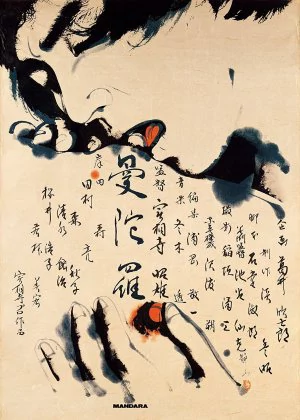
Jissoji's most Japanese New Wave-like film I've seen so far. The mix of sexuality, politics and brutality is reminiscent of the work of Wakamatsu, only Jissoji has a more controlled and deliberate signature, though no less experimental. It makes Mandala a very intriguing film. The cinematography is splendid, with its odd angles and meticulous color work. The outside scenes aren't quite as striking, but still sport some interesting editing. The plot is a bit hazy, the soundtrack nerve wrecking and the performances are spirited, all adding to the unique experience. Not the easiest film, but worth a watch.Read all
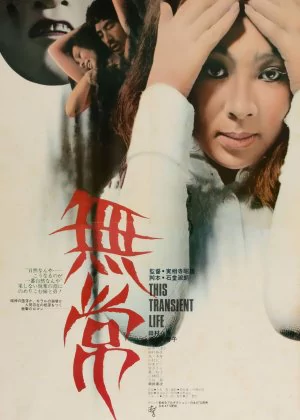
The real start of Jissôji's career and the first in his Buddhist trilogy. This Transient Life feels like a typical film of a promising first-time director (though Jissôji had made some shorts before this), a film where its director does his utmost best to prove his worth and goes all in. That makes for a slightly uneven film, but it sure is interesting. Pinku meets arthouse, with a splash of Japanese New Wave. It's an interesting combination of elements. The stark black and white cinematography is very nice, the pacing of the film slow but deliberate and the intrigue is strong. The soundtrack is a letdown though and some scenes do go on too long. Still, Jissôji left his calling card with this one.Read all
Dialogue
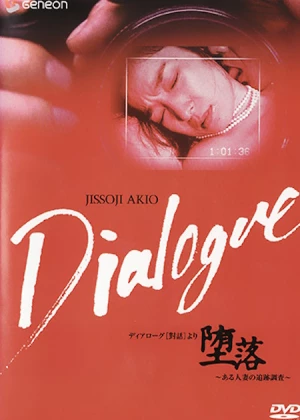
Akio Jissôji started his career with a bang, but later on, he had a much harder time getting his projects off the ground. Dialogue is a TV-grade project that doesn't even pretend to be anything more. For a sexy TV thriller, it's not all that bad, and I had a pretty decent time with it, but Jissôji is capable of so much more. The performances aren't great, the cinematography is pretty functional and the 4:3 ratio is an eyesore. The plot is somewhat interesting though and the wife's descent into depravity, while both the PI and her husband are scamming her, is intriguing enough. I just wish there was a bit more to it.Read all
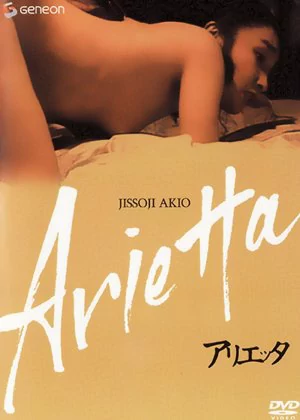
A more straightforward pinku from Jissoji. I'm not entirely surprised he directed a film like this, it's not all that far removed from some of his other work, but without the added appeal it feels quite bare bones and Jissoji doesn't really do that much to break outside the boundaries of the genre. The setup of the film isn't too bad, but the production feels pretty cheap and none of Jissoji's usual traits manage to shine through. I guess the acting is above average for this type of production, the drama is mildly effective, and it's certainly not as sleazy as some others, but Jissoji is obviously capable of much better.Read all
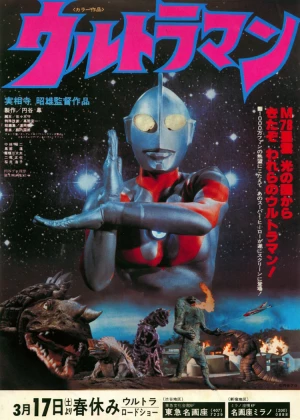
A compilation film of Jissoji's Ultraman series. That explains some of the shifter-looking monsters, it also explains the excruciating pace of this film. The funniest thing though is that Jissoji is a lauded arthouse director, who also loved doing these ultra-cheesy B-movie projects. Kaiju fans will have a field with this film. The monsters look terrible (men in cheap suits, the eyes in particular are just comical), but the maquettes are pretty fun and the pacing makes sure there's no time to slow down and get bored. It's a bit messy if you've never watched the series, then again, it's not all that complex so Kaiju fans won't have any trouble figuring out what's going on. Amusing, but far from great.Read all
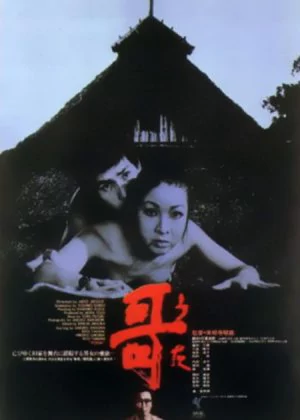
A slightly disappointing film from Jissôji. So far I've been very impressed by his work, even his slightly older films. Poem was the first pre-80s film I watched from him and it's the first one that didn't really captivate me. Maybe because it was too grounded in the arthouse scene, where his later films have stronger genre elements. The film follows the demise of the Moriyama family, a notable and wealthy house. Ihee, the head of the family, is worried about his legacy, as none of his sons seem worthy to follow in his footsteps. He gets suspicious when Toru (his second son) weasels his way back into their lives and starts asking questions about his family's wealth. The stark black & white cinematography is interesting, so is the way Jissôji plays with the soundtrack, but the pacing is quite slow and by itself the styling isn't remarkable enough to carry the film. There's definitely beauty here and Jissôji shows he's a talented director, but it's not quite enough to justify the runtime and the pacing.Read all